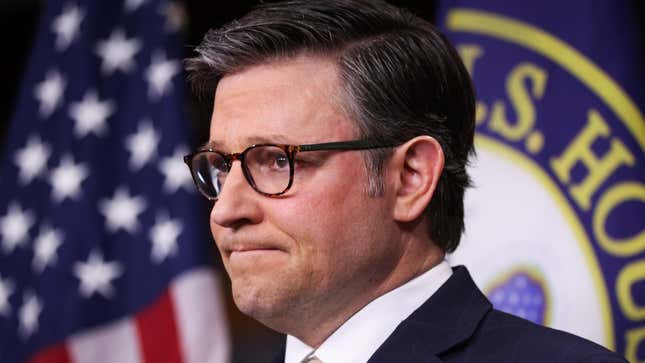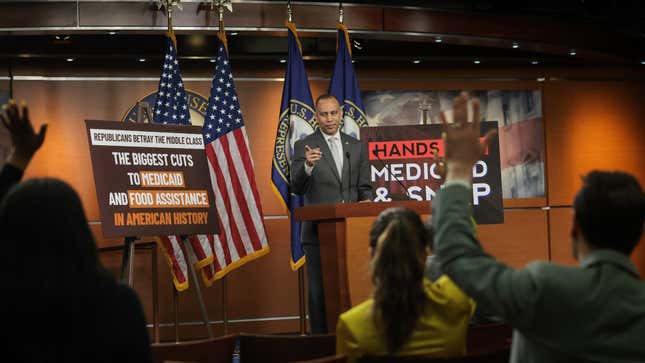
Yesterday, House Speaker Mike Johnson attempted to justify planned backdoor cuts to Medicaid by claiming that it would “return the dignity of work to young men who need to be out working instead of playing video games all day.”
We could get into the details of why this statement, on its face, is absolutely meaningless (primarily because most people on such benefits are in work, swiftly demonstrating the entire argument is disingenuous bullshit about robbing from the poor to overfeed the rich), but Tyler Wilde at PC Gamer has already done an excellent, succinct job of this. Instead, I want to focus more on the phenomenon of blaming video games themselves, and what this always reveals.
It’s hardly an original piece of rhetoric. Politicians have been blaming video games for everything from murderous rampages to obesity since their inception, and even then, games were only taking over the role from “video nasties,” D&D and death metal in the ‘80s, the “war on drugs” in the ‘70s, comic books in the ‘50s, the Catholics in the 1850s, witches in the Middle Ages…
In the 18th century, reading was described as a “mania” and a “fever” as young people wasted their lives away in the pages of books, with spurious claims of copycat violence becoming increasingly common. Goethe’s The Sorrows of Young Werther was blamed for a string of suicides, with little to no evidence, the moral panic itself far more likely the cause.
In 370 BCE, Plato writing Socrates’ words in Phaedrus took the helm of another moral panic. He wrote, “This invention will produce forgetfulness in the minds of those who learn to use it, because they will not practice their memory.” Socrates was talking about the act of writing.
The concern that the new thing the kids are into is causing society’s ills is as old as society itself, and it has long served a very specific purpose: to distract from the far more obvious causes.

There are very many examples of how video games are used as scapegoats for far more serious, fundamental causes of issues. But generally, the same purpose applies: it’s misdirection. The politician’s one hand is frantically waving around over here, gesticulating about the harm these games are doing to our youth, while the other hand is quietly passing an unseen wad of cash to a rich chum.
When Mike Johnson drops in his line about young men requiring Medicaid support because they’re “playing video games all day,” this is a very deliberate act of misdirection. In his speech, he even suggests that this act by these dastardly fellows is taking money away from the deserving recipients of…access to healthcare, single mothers, the elderly, and the disabled. See, video games are not only hurting these foolish men, but also indirectly causing suffering toward other groups you care about! Do not be in any doubt for a single moment that Johnson wouldn’t instantly turn on single mothers, the elderly, the disabled, or anyone else, if it were politically expedient for him, but in this example, he’s carefully chosen his specific misdirection.
Hell, let’s not lose sight of the fact that just one month ago, Mike Johnson trotted out the exact same line about “able-bodied” men mooching off the state with their games. Except that time it was as a part of his promises to not cut Medicaid. And this is the same Mike Johnson who, in January this year, tried to stop a bill that would allow new mothers to remotely vote in the six weeks after they’ve given birth. In the same month, a leak revealed Johnson’s proposals that would remove tax cuts from single parents. The point is, he doesn’t give a shit about single mothers and the awful effects video games are indirectly causing them.
What he—and the Trump administration at large—actually care about is ensuring their rich friends get richer, and if that involves nickel-and-diming the poorest, then perfect. We’re all arguing over whether video games cause lethargy or whatever, while Medicaid intended to be raided for $880 billion at the same time as corporations and billionaires receive tax cuts totalling $6.8 trillion.

To actually, meaningfully address the issue of those in long-term joblessness would take not only a lot of hard work, but also require money be taken from the richest to afford the changes. The fact that most of these apparently languorous men who play games all day are in fact in part- or full-time jobs, but are paid so badly that they cannot afford even the most basic healthcare, would seem like a systemic societal issue that should demand addressing. Something is fundamentally wrong when those who work the hardest are paid the least, and then it’s those people (including single mothers, the disabled, and every other category of the working poor) who are not only demonized, but targeted to have even more money taken from them. That’s an atrocity, but don’t notice! Look at the wavy hand pointing at the video games!
Or take the incessant blaming of video games (and all the other media that came before it) for real-world violence. Since Doom was co-blamed for the Columbine High School massacre, the scapegoating of gaming for violence and gun crimes in the United States has become commonplace. This is despite there never having been any meaningful evidence to suggest any causal link whatsoever, the theory repeatedly debunked, year after year, for decades. Trump was at it in 2019. France’s president, Emmanuel Macron, tried it in 2023. (Macron also threw in Snapchat and TikTok, to be very contemporary.) And the reason is the same.
I’m not going to go over the real causes of gun violence in the United States yet again, because we all already know it’s about poverty, desperation, the lack of access to social services, and so on. We all already know that 46,728 people didn’t die from gun-related injuries in the U.S. in 2023 because of Call of Duty, given that Call of Duty is also played in gun-totin’ Canada, where guns cause 2.1 deaths per 100,000 people, compared to the U.S.’s 10.6. There’s also never been any proof that video games are the reason the United States has 120 guns per 100 people, double that of the second-place Falkland Islands and its population of 3,000 people, and well over double the 52.8 guns per 100 people in third-place Yemen.
Dealing with gun violence is wildly complicated, from the NRA’s hold over politicians, the widespread misinformation about what’s written in the Third Amendment, and the complete restructuring of society required to provide the social support where it’s needed to address the poverty and addiction that leads to so many of the problems. The epidemic of school shootings, happening with a frequency and gruesome normality that’s utterly unlike any other developed nation, demands politicians deal with the reality of the lives of America’s young people in a way that is close to impossible without being decried as—boo, hiss—socialism.

So, blame it on video games! It’s Grand Theft Auto’s fault! That game that reflects America back to itself is, um, the cause! Just don’t look at the quiet hand that’s accepting the dossiers of information on gun owners handed over by the weapon manufacturers.
Video games aren’t unproblematic. Video games are as political as any other form of media, and they can absolutely be used to attempt to spread harmful ideas or normalize bigotry. Just like cinema, theater, books, songs… We should absolutely always be thinking critically about the games we consume, and providing counterpoints when we disagree with messages. But despite this, and despite the vital importance of it, whenever the words “video games” are coming out of a politician’s mouth as a culprit for society’s ills, immediately redirect your eyes to see what their other hand is doing. Because there’s always something there they don’t want you to see, think of, or ask questions about.
.